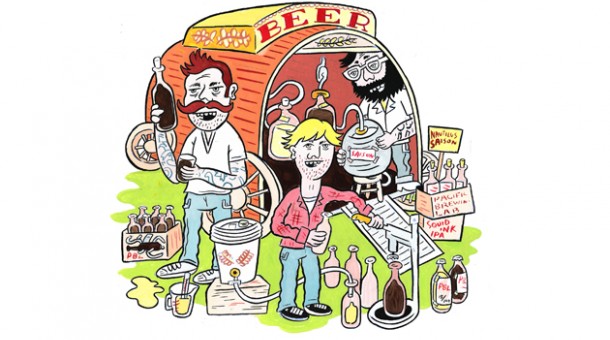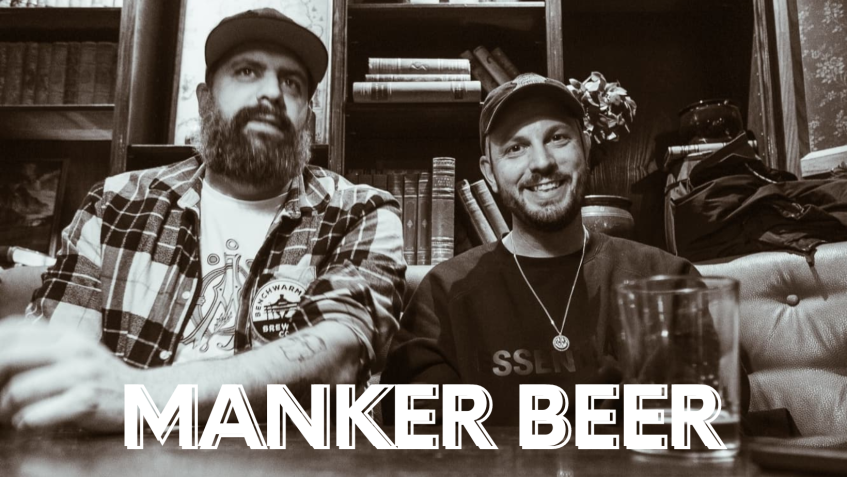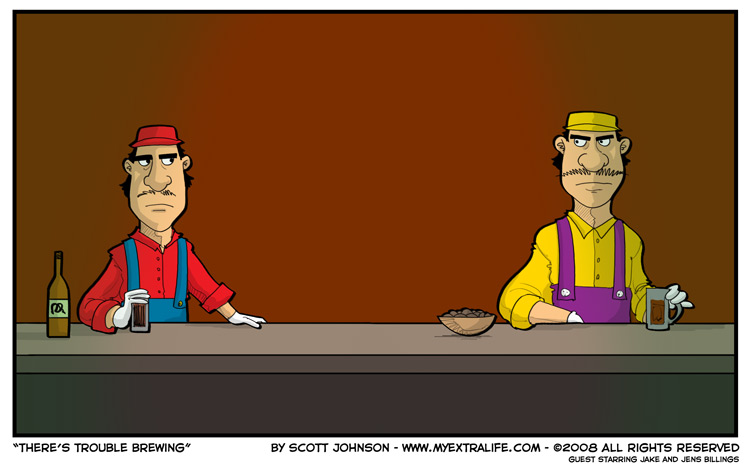The following article is written in English to fully represent the answers given by the brewery representatives we have asked to participate, and for them and others to be able to answer any follow-up questions..
/ Manker
In a collaborative effort of everyone involved with MankerBeer we decided to take the step from pen and paper and our own thoughts on the “what is a craft beer/brewery” debate to focus on the craft beer creators and what they think. We can understand the need of defining craft beer, but just like Luke Nicholas of New Zeeland craft brewery Epic say, why not instead define “industrial beer”? On an international scale, few with attention to the international beer scene is likely to have missed the alarming debate article jointly written by some of Belgium’s most well known brewers. Their argue against what they consider to be new actors popping up claiming to be actual breweries, but merely brewing at other locations due to lack of an own brewery.
 While we understand their in many ways sound arguments, we still believe that they miss part of the larger picture. Surely, the origin of a certain beer and where and by who it is produced is very important and not only a matter of giving cred to the actual brewery producing the beer; but it is also a matter of marketing, or more explicit – false marketing. At the same time we believe it is important that we ask ourselves – what is brewing all about? What is a brewery? What is a brew master and what is craft beer? These questions might appear simple, but when you think of it – at a restaurant, who creates the food? The recipe maker, the head chef or the other chefs making sure that the dish represent the vision of the creator of the dish’s recipe? Same with music, are the studio, the artist, the chords or the technicians not all important for the final piece to exist? Can beer, music or food exist with these actors separated, or do they all have to work together at the same spot at the same time?
While we understand their in many ways sound arguments, we still believe that they miss part of the larger picture. Surely, the origin of a certain beer and where and by who it is produced is very important and not only a matter of giving cred to the actual brewery producing the beer; but it is also a matter of marketing, or more explicit – false marketing. At the same time we believe it is important that we ask ourselves – what is brewing all about? What is a brewery? What is a brew master and what is craft beer? These questions might appear simple, but when you think of it – at a restaurant, who creates the food? The recipe maker, the head chef or the other chefs making sure that the dish represent the vision of the creator of the dish’s recipe? Same with music, are the studio, the artist, the chords or the technicians not all important for the final piece to exist? Can beer, music or food exist with these actors separated, or do they all have to work together at the same spot at the same time?
While a brew master is a title earned by studying it is also a profession, but how many brew masters are also the head brewers? How many brew masters create all recipes? And oppositely, how many brewers create the recipes rather than following instructions and procedures (off course, in most cases it is a joint task shared by everyone involved)? How many of them supervise and steer the brewery in a certain direction? How important is the brew house? Doest it matter if it is a fully automated or an all manually driven one? Our point is not to claim that anyone involved in brewing are not important and special, people dedicated to a shared passion and people deserving all the glory for their hard work that can be given to them. Our point is to show that a modern brewery can more or less be fully automated with a head brewer taking care of the recipes, which makes his or her geographical placement less important. The handicraft and hard work that brewers put into their work, every day all year long is not in any way to be forgotten, but in practice – today there are other possibilities out there.
We wish to open up a debate focused on some key areas, all important when discussing the production of beer.
a) What is a brewery (ownership, set-up, who does what etc)?
b) What is a brewer (creator of recipes, responsible for the direction of the brewery etc)?
c) What are the other possibilities and how are they to be labelled and their beers marketed?
When we reached out to some of the most respected and well-known representatives in the brewing community we did not have time to focus on all of these questions, but decided to focus more on how they identify themselves and what, in their opinion a brewer and brewery is. We wish to offer the views on representatives from all over the world; brew masters, brewers and gypsy brewers alike. All of them were asked the same three questions.
1. How would you define the term “brewery”? I.e. what is required from your perspective to call yourself a brewery?
2. What, in your mind, defines a brewer?
3. How would you define your brewery/business/brand?
Jeppe Jarnit-Bjergsø – Evil Twin Brewing
1. A “brewery” is a company that makes beer and have an actual brewery. Evil Twin is a brewing company, making beer but doesnt have an actual brewery. I would never call it Evil Twin Brewery because it is not. I even like to call Evil Twin a Beer Production Company, because that is exactly what it is!
2. A man and a woman that makes beer. Am I a brewer, yes. Is Sam and Garret brewers, yes. Do we brew every single beer our company release, no. Does anyone, probably, but I haven’t heard of any. So, we are all brewers, no matter what the set-up of our company is.
3. A Brewing Company of a Beer Production Company without own brewery. Contract Brewing Company, perhaps, as I brew my beers under contracts at other peoples breweries. Problem with that term is a lot of people believe thats a company that send an email asking for an IPA and get a beer back. I make my own recipes, own labels, even source special ingrediences. I go and brew as often as possible as well, so its not much different from a lot of “real” breweries out there!
James Watt / Brew Dog
1. A Brewery has to make beer. You can be a gypsy brewer but you can’t be a gypsy brewery. To be a brewery you must have a physical location which you own as a company and you must make all your beers there.
We would also like to propose this definition of a European craft brewer.
A European Craft Brewer is
1) Authentic
a) brews all their beers at original gravity
b) does not use any adjuncts to lessen flavour and reduce costs.
2) Honest
a) All ingredients are clearly listed on the label of all of their beers.
b) The place where the beer is brewed is clearly listed on all of their beers.
c) All their beer is brewed at craft breweries.
3) Independent
Is not more than 20% owned by a brewing company which operates any brewery which is not a craft brewery.
4) Committed
If the brewer has an estate, at least 90% of the beer they sell must be craft beer.
2. Someone who makes beer for a living.
3. BrewDog is a craft beer brewery. We do everything on site, from taking in the best raw materials and to shipping the packaged craft beer. In terms of (the BrewDog) beer brand, it’s not what the brand owner thinks, it is what the people thinks. A brand is a person’s gut reaction towards a product, service or company.
It is not what the brand owner thinks it is. It is what the people think it is. Brand management exists entirely in the minds of people.
A brand also transcends everything. Everything is branding as everything contributes to how people view your company, brewery & beers.
Alexi Front / Local Option
1. A brewery is a facility where beers are made under a label defined and developed by the owners and operators of the facility. Breweries invest in the overhead of starting a company, owning equipment, paying staff, etc. A brewery is responsible for making their beer from start to finish. Breweries often release beers in a format of ‘core brands’ that are year round produced and seasonal (although this has changed with some new breweries that only release one offs or variants of certain ‘core beers’).
2. A brewer is an individual or a group of individuals operating a company that markets and in some cases sells its own beer. The beer they sell; however, is not made at a brewery they own. There are varying levels of involvement that brewers have in the creation of their own products. Some are very active and hands on with the recipe development, production of their beer, sales of the beer, etc whereas others are moreacquiescent. Many brewers enjoy being brewers and have developed a certain lifestyle that would be impossible if the also owned a brewery.
3. As of now we are brewers with a brewery mentality. We are concerned with all the aspects of production, sales, cooperage, marketing, distribution depletion, new markets etc. Some of these issues are concerns we know ‘gypsy’ brewers never have to worry about. However because our objective is to open our own brewery we have gone head first into learning as much as possible about operating a brewery so that when it comes time to open our own we won’t make the same mistakes our friends that own breweries have. Furthermore, unlike ‘gypsy’ brewers we have a home and it’s our bar Local Option.
Jean van Roy – Cantillon
1. A brewery is a place where someone transform raw materials into beer.
2. A brewer is the person responsible of this transformation. It means that this person have “to get one’s hands dirty”
3. For me, Cantillon is more than a brewery. I consider that the building is “alive”, playing a rol in the natural fermentation. I don’t have this feeling when I visit an another brewery. Cantillon, it’s a whole, a brewery, a family, a know how to produce a mythic beer.
Thomas Bingebo – Oceanbryggeriet
1. Brewery = production unit. Independent breweries may not be owned, partly or in full by a large market actor. The Association Swedish Independent Breweries regulations is very similar to the English, as well as the ones of other countries.
2. I am head brewer at Ocean. We also have two other brewers. Rubber boots on. As a brewer you are part of the process, brewing, transferring, filtering etc. No sitting on the couch. Note though, I am not a brew master – although with a BA in Modern & Social History. Education should be premiered.
3. Brewery, locally, regionally with reach over all of Sweden including Österbotten.
Sebastian Sauer – Freigeist
1. A brewery is about a real installation for me, no matter how big it is. The other companies brewing their own beer or ordering their own beer are projects, brewery renter or whatever else, but no companies which you define as “breweries”.
2. Someone who is actually brewing the batch is the brewer.
3. Freigeist started in our own brewery Braustelle in Cologne, but nearly all the beers are nowadays brewed at a friend’s brewery, so I would call it a brewing project. Same story with The Monarchy.
Jessica Heidrisch – S:t Eriks Bryggeri
1. Strictly: A brewery is a physical establishment that has been granted a license to produce malt liquor, ferment it into a alcohol containing beverage and to sell the product there off. Type of beer produced, or size, doesn’t matter for the definition of what a brewery is.
2. A brewer is the person in the brewery who produces the malt liquor, with the aim to ferment it into beer.
3. How would you define yourself and S:t Eriks?
Me, a brewer and S:t Eriks a brewery, since we have license to produce malt liquor, ferment it and sell the product.
Andy Baker – Summer Wine
1. I would define a brewery as a physical entity. You have breweries and you have brands. For example if you own and operate your own brewhouse, producing your own beer then you are a brewery. If you give recipes to a brewery to produce then you are a brand. This is not necessarily a detrimental thing but is worth pointing out. When people say Mikkeller is a brewery they are wrong in my eyes as there isn’t a physical Mikkeller brewery so therefore it is a brand.
People who cuckoo brew as we say in the UK are those that brew their recipes on other peoples brewing kit. Often this is because they can’t afford their own kit, don’t want to take the risk of purchasing their own until they know that the industry is for them or they are waiting for their kit to be built/installed. These guys are like the halfway house between a brand and a brewery. I guess I would just describe them as brewers but not breweries. They make their own beer but not on their own kit.
2. Quite simply somebody who understands beer as well as having the ability to make it. There are people that can work a kit and re-produce a recipe but they are not what I would call brewers. They are more of a production operative as they are following simple instructions. What makes a brewer is the ability to adapt and to understand the live product from mash temperatures at different times of the year to changes in water ph levels to seasonal variations with malt and alpha acids in hops. Being able to create different beers and balance the beer with the use of malts,hops and yeast as they certainly don’t all work together which some people fail to realise. Often people really rave about a barrel aged beer but sometimes strong barrel flavours are used by breweries to cover flaws in the beer rather than just throw it away. This is one of the reasons why we always release an un-aged version of the beer that we intend to age. It allows drinkers to dry the same beer in different formats. That is what makes a brewer. Above all else, the ability to be consistent is what makes the difference between a brewer and a good brewer
3. As a mad house!
We are most definitely a brewery. The number of hours and brews in a week that we go through leaves me in no doubt. I guess that I could also say that we are a brand as well in one respect. People see the SWB crown cap brand and know who we are and what to expect. They know certain beer names such as Diablo and know what it is. That just comes from having been around for a while. I think most breweries through time become both breweries and brands. Brooklyn and Brewdog are some of the finest examples out there of this.
We spent many months ‘dialling’ in our beers to make them as consistent as possible but also deliver some more edgy beers along the way. We try not to do too much of this as we have certainly gained our reputation from the core range of beers and are proud of that and not just from wacky barrel aged beers or limited release tickets. One a year of this type of beer is enough for us usually. What we would describe as more regular one off brews are still quite common from us as occasionally people just have ideas and need to let some steam off to keep the creative juices flowing. It can be quite fun once a month do just have a freestlye day.
Victor Dahlberg – All in Brewing
1. To be honest I don’t really care about the definition. All In Brewing will have their own brewing equipment later on, however we have just hired a brewer (Lucas Monryd) that will work at Brewski. Lucas will brew both our own beers and the beers for Brewski on their equipment while our distribution company (All In Beverage) will sell both the beers for All In Brewing and Brewski. How people choose to define us is up to them.
2. Rubber boots and early mornings I guess? 😉
3. We produce the beers that we like in ways that are possible for us at the moment.
Henok Fentie – Omnipollo
1. To me a brewery would be a production facility for beer. Like a bakery.
2. There are many types of brewers out there; brew masters who have years of theoretical (and practical) studies behind them, entrepreneurial craft brewers who might have mastered the art through diligent home brewing, home brewers etc. each with his/her own unique perspective on how to make beer.
Lowest common denominator is that all make beer. That is what a brewer is to me, someone who makes beer.
3. Omnipollo is in essence an advanced home brewing operation.
We write recipes, we source ingredients, we brew, make labels, sell, live and breath beer.
Are we a brewery? No. Do we make beer? Absolutely.
What conclusion we can make out of this? Well that is to elaborate on further in a later post but what I believe we all can agree with is that none of the above speak against any other. They all share the passion for beer, all perceive them as equally important for the beer making process and no-one claim to be something they aren’t. Would you agree?
/ Manker, M2, Fredrik, Ludvig, Balder and Kristopher



